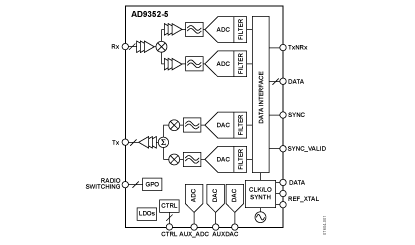AD9352-5: В WiMAX RF MxFE Transceiver
The AD9352-5 is a fully integrated transceiver for IEEE 802.16 WiMAX wireless network systems. The RF MxFEв„ў combines the RF front-end with mixed-signal baseband enabling an easy-to-use digital interface to the baseband ASIC or FPGA. The AD9352-5 operates in the 4.9 GHz to 6.0 GHz range covering most of the licensed and unlicensed bands. Channel bandwidths of 3.5 MHz, 4.375 MHz, 5 MHz, 7 MHz, 8.75 MHz, 10 MHz, 14 MHz, 17.5 MHz, and 20 MHz are supported.
The direct-conversion receiver has state-of-the-art noise figure and linearity and requires no external components with the exception of a balun. The complete RF subsystem integrates an autonomous AGC loop and dc offset corrections, thus elimi-nating the need for high speed interaction with the baseband processor. The received signal strength indicator (RSSI) has over 80 dB of dynamic range with 0.5 dB resolution and is accessible via the serial interface.
The received signal is digitized with a high dynamic range 12-bit ADC. Decimation and channel filters produce a 10-bit output signal at the appropriate sample rate determined by the bandwidth mode. The transmit path takes a 10-bit input data and interpolates before converting to the analog domain and upconverting to the carrier frequency.
The highly linear transmit path has excellent spectral purity with sideband noise less than вҲ’134 dBc/Hz at 22 MHz offset and offers EVM of вҲ’36 dB at 0 dBm output power. The transmit power is detected by an accurate power detector and autono-mously controlled with a range of 58 dB and 0.25 dB steps. The output power can be calibrated at the factory by a single measurement.
The reference frequency is produced by an internal crystal oscillator with a digital programmable frequency with 0.012 ppm resolution thus reducing the total bill of materials of the device.
An internal auxiliary ADC and two auxiliary DACs are avail-able for system monitoring and control. Three general purpose I/Os are also included and can be register programmed or auto-matically sequenced by a user-defined state machine. Mode control is via a 4-wire serial port and four real-time I/O control pins.
The AD9352-5 is powered from a single 3.3 V supply and contains on-chip LDOs for each function to eliminate external regulators. The AD9352-5 is packaged in a 9 mm Г— 9 mm, 64-lead LFCSP.
Applications- CPE
- BWA/WiMAX infrastructure
- Wireless backhaul
- Radar detect
AD9352-5 зү№зӮ№
- RF transceiver with integrated ADCs and DACs
- Frequency: 4.9 GHz to 6.0 GHz
- 3.5 MHz < BW < 20 MHz
- Superior receiver sensitivity with a NF of 4.5 dB
- Highly linear and spectrally pure transmitter
- Tx EVM: вҲ’36 dB
- Tx noise floor: <вҲ’134dBm/Hz
- Autonomous AGC
- Automatic frequency correction: <0.012 ppm
- Integrated fractional-N synthesizer
- 28 Hz LO step size
- Integrated phase noise: <0.8В°rms
